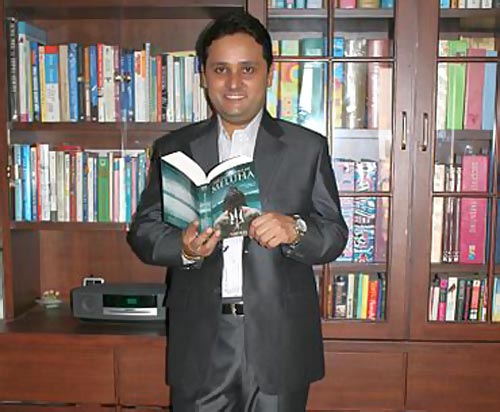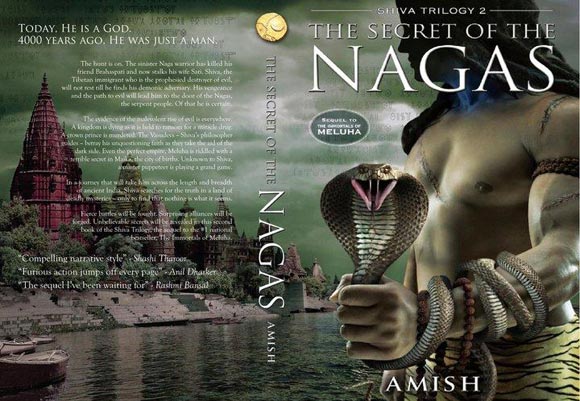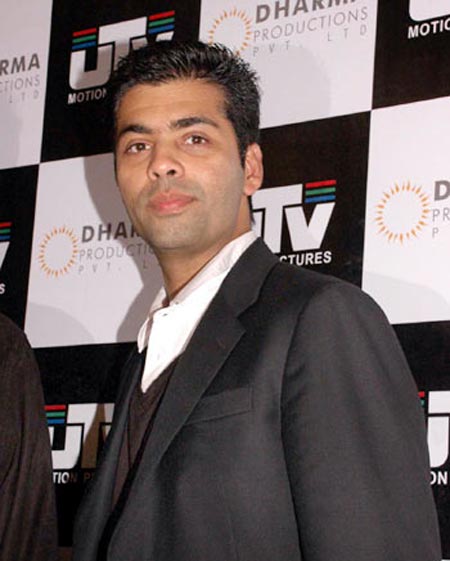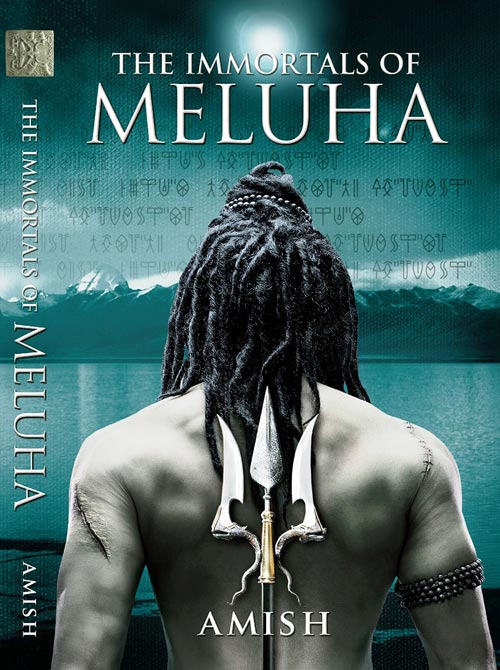 | « Back to article | Print this article |
Interview with the author of The Immortals of Meluha
Author of bestselling books Immortals of Meluha and The Secret of the Nagas talks about the right to free speech, the need to draw the line, the corruption of the English language and Chetan Bhagat.
His books have sold millions of copies and now Amish Tripathi's Immortals of Meluha is all set to be made into a movie courtesy Karan Johar. And yet, the banker-turned-author has no airs or arrogance that comes as part of a package deal with some authors soon after their books begin to sell.
In an interview with rediff.com, Tripathi talks about the recent Rushdie controversy that took the Jaipur Literature Festival by storm, the hazards of free speech, his upcoming movie and Chetan Bhagat even as he defends what his and Bhagat's critics call 'corruption of the English language'.
How would you say your life has changed since the books and now the movie rights?
My life changed dramatically during the writing of the first book. I used to be an atheist. I became increasingly spiritual and became increasingly devoted to Lord Shiva.
I started discovering faith not just in my religion but also in other religions. I realised that there is beauty and ugliness in all religions but the choice is up to us to what we want to see.
Most of the changes were spiritual. I became believer, became a lot calmer than I used to be and also how lucky I am and how kind God has been to me.
There have been external changes too. The first book did well and after the second book, I resigned from my job because I realise I could pay my bills with (my writing).
So the changes after the release of the books have been external in the sense that I finally have freedom to pursue my passion and make a living out of it.
Now I find a lot more time to do the kind of things I want to do -- travel a lot more, read a lot more. I was always a voracious reader but couldn't get time to read.
That is a wonderful place to be.
What about the fame? When did you realise you were famous?
Let's be real I am not that famous where people recognise me on the streets. That doesn't happen.
Yes, but that has to do with the fact that you aren't like... let's say... Chetan Bhagat who is out there. But you are one of the bestselling authors in the country...
I need to have that reality in my own head... Yes the books have sold well but I don't think I am famous.
Now you're trying to be humble.
No I am not! You must understand that the fame is for the books.
It is important to have that sense of reality otherwise it is easy to lose one's head.
I don't care what others have to say but I believe (the books) are a blessing from Lord Shiva. I had never written even a short story in school; yes I came from a family of priests and a family that (encouraged reading) but it is like saying I have all the ingredients for a meal so I can cook a meal. It doesn't work that way.
I honestly believe the moment I start thinking 'Oh it is my brilliance etc' the blessings will stop.
'Religion and science can go hand-in-hand'
Ok let me take you back to the Jaipur Literature Festival where you were being mobbed. After your first session, you went into a marathon book signing session that took you almost an hour to get out of! That sort of thing is unheard of! You almost missed lunch. I understand the mobbing that happened in Jaipur doesn't happen in Mumbai. But I am certain at some point in Jaipur you must've realised, "Oh boy..."
...I'm hungry? (Laughs)
No really. I refuse to believe there was a point where you said to yourself...
No, of course there was. It did/does feel nice. But the point I am trying to make is that it is important for me to (remain humble). It is (in a skewed way) in my selfish interests to be humble. I genuinely believe that someone is blessing me. So if I start developing ego about it, it will go. Most religions will tell you that if you want to attain a higher self you have to control your ego.
Over the last few years, there has been a trend of novels that attempt to retell myths/history -- be it your books or Ashwin Sanghi's (The Rozabal Line and Chanakya's Chant) or the one by Divakaruni (Palace of Illusions). What do you make of this need to retell the myths?
When you are not confident about yourself you'd like to run away you're your past or irrationally defend it. On the other hand if you are confident you are more willing to look at your past and want to understand it. The way I see it, as a society, we have been growing more confident about our selves and our identity.
Secondly, people are realising that people are turning to religion. But they'd like to have religion packaged in a modern (manner). Perhaps that desire shows in the kind of books that are coming out now. So books that reflect the philosophy in our religion but are written in a way that you and I can relate to are becoming popular.
And finally what is happening is physics, genetics, spirituality... they're all converging...
... Well they always did. Ancient scientists or artists like Michelangelo were all polymaths...
True. But the way I see it the pendulum then swung to the other extreme where religion (and spirituality) was disregarded entirely. Now, I think we are coming to some sort of a balance with the pendulum swinging back slowly. (The masses) are now realising that the talk of 'matter' in physics is something that has been spoken about in our scriptures. We are realising that religion and science can go hand-in-hand.
'There is a potential god in every one of us'
What does the idea of 'humanising' god mean to you?
There are various concepts of god. There is one concept of god being formless; another one is of god taking a form as in Bramha or Vishnu and the third concept is where god comes to earth in the human form.
So you have Vishnu coming to earth as Rama or Krishna where god takes birth does his duty and moves on. There is also a fourth concept where human being becomes god -- Gautam Buddha for instance. He was a man who discovered god within him.
I have always found this concept very inspiring. What that means is that there is a potential god in every one of us. All we have to do is discover that and grow.
You're in the business of retelling religious myths and the Jaipur Literature Festival was dogged with controversy over an author and a prophet. Where do you stand in this entire debate?
I am a religious person so I like it when religion is respected. But I will not question the right of someone to disrespect religion if he chooses to. That is his choice.
I will not do it but I don't have the right to question someone else's choice.
Maulana Wahiduddin Khan, in an article quoting from the Holy Koran points out that if someone has said something that hurts you, you must invite him for a debate and you put your point of view rationally. If you convince him, well and good if not, you must agree to disagree. This makes sense to me.
Violence or the threat of violence is completely wrong and unacceptable. Also we live in India, a free country. People have the right to cause offence and take offence. But no one has the right to create violence, or issue a threat of violence or stop someone else from speaking their mind.
There should be a debate rather than violence or a threat of violence.
What about you? When you're writing, where do you draw the line? Or do you?
I genuinely believe that my books are blessings of Lord Shiva. I had written nothing in my life before. So I believe this (the words, inspiration etc) comes from up above (points skywards). If I try to control it I will dishonour the blessings. So I don't control it. The way the story comes, I write it down, which also makes me a very stubborn person with my editors as well (Smiles).
'Tantra philosophy has earned a bad name'
Has someone had an issue with what you've written?
Well, I've had some senior readers contesting the version of the myth I have chosen fictionalise (But that's about it).
I like having these discussions because as it happens I have studied various versions of the myths too and my argument is even though there are contradictory versions of the same myth, you can choose to believe one and disregard the other.
Is Ganesh the elder brother or is Karthik? The answer to that will depend on which part of India you come from – North or South.
Was Sitaji a warrior or not? Was Ravana a demon or a Shiva devotee who made mistakes? Did Shiva ever run into Rama or did the latter worship him? The answers to these depend on what version of the Ramayana you've read.
There was a young reader at the Jaipur Literature Festival who took offence to you portraying Shiva as a pot-smoking cool dude, which she felt was sending incorrect signals to young readers... Could you respond to that?
(Laughs) Yes! See, there are sects of Shaivites who believe that the way to worship him is by getting intoxicated. There are sects who drink bhang, smoke marijuana and think there is nothing wrong with it. It also ties in with the tantra philosophy, which regrettably has earned a bad name because of a few extremists doing stupid things.
The concept of that philosophy was that you experience all the rasas of life so that you can move beyond them because if you haven't experienced them and go on to become an ascetic, your mind stays there even though your body may have moved on, which is not a great thing.
This path isn't suggested to most people because they don't understand the idea of control and don't get that the key is to move on.
Ok. The movie. How did that come about?
A Hollywood-based agency called Creative Artists, which is one of the largest movie talent agencies in the world have taken me on as a client and are representing my movie interest across the world. Dharma Productions has the movie rights for all Indian languages outside of English. The international deal is still under discussion.
This won't be a low-cost movie. And movies of this scale don't get made only on business sense. They get made by people who feel strongly enough to push them through -- movies like Mughal-E-Azam, Avatar, Lord of the Rings...
... Is that the league you're looking at?
I hope so. Because Karan looks at this as a big-budget and big league movie
'A well-told story will work'
Mythological movies haven't done well at the box office. Is that an apprehension?
When I was trying to publish my first book, there was an apprehension of whether it would work at all or not. It was rejected by every publisher. But my agent believed in it and he and I published it ourselves. And the most common reason for rejecting was this – that no one would be interested in it.
One publisher told me that my storytelling skills were good but I chose the wrong topic. I was even told to write something about my days at IIM-C or some corporate scandal because that's what would sell.
I understand that apprehension because history didn't seem to justify it and I didn't see it doing well either. But it did. And I suspect this is because unlike in let's say Greece and Egypt, in India our mythological stories are central to their being. For us Lord Shiva is very real, his story isn't just another story. The same holds true for other gods -- they are core to our very being.
And I believe if there is a story that is well told and touches the core of one's being, there is no reason it wouldn't do well.
Will you be involved in the script writing?
I do have creative consultation rights but I do accept that a project needs a captain and in the case of a movie, the captain is the director.
Has the director been finalised?
No, not yet.
Do you have a say in who s/he might be?
It'll be fair if Dharma says things on that. It won't be fair to comment on that.
'The idea was to make my story relatable'
A friend recently called up to complain that he didn't like the book. He brought my attention to the very first line in your book and was deeply offended by some of the things like the fact that Tibet didn't exist in 1900 BC ... there have been...
Of course Tibet didn't exist. See, you must understand that I am speaking of an age that is regrettably foreign. So if I use pure terms of the era, like let's say Jambudweep, instead of India, it'll not be relatable at all.
I sort of took an inspiration from Tulsidas whose Ramcharinmanas (unlike popular belief) was written in Awadhi and not Sanskrit. What he did was simplify and modernise the words for his era.
Most of us know Hanuman's name as Bajrangi whereas his real name was Vajra-Angee Vajra meaning thunder and Anga is body. Now Vajra-Anga makes it some what distant from Tulsidas' age. So he made it Bajrangi, which was more relatable.
The idea was to make my story relatable too. Does making Jambudweep, India hurt the story in any way? No! But does it make it more relatable? Yes! So they know where, let's say Tibet or Sutlej is.
Now I know there are purists who won't like it. Even with the language, some people were suggesting I use classical language. Then again English didn't exist at the time, let alone classical English. The language that was practiced was Vedic Sanskrit not even Classical Sanskrit that is used today. There are perhaps less than a few hundred people who know the language!
If I was going to be inauthentic in any case since I was writing in English why not make it modern and relatable?
Fortunately for me there weren't as many people who were not passionate about the language as they were about the story and the philosophy.
Glad you brought this up. What do you make of this whole argument of language purity that has often been used against Chetan Bhagat? Also have you been at the receiving end of the language and grammar controversy?
(Laughs) Yes! But not very aggressively. But I find the entire debate to be childish and immature. Because essentially what we are arguing over who's passion is greater.
Let me give you an example. I was very excited recently when I read a report which suggested that the same climatic changes had brought about forest fires in Russia around the same time that there were floods in Pakistan! It was a mind-bending report!
Now someone who is passionate about language would probably fall asleep by the second paragraph. I loved that report! Now should I judge a 'literary guy' who finds that report boring? No! Because it doesn't tie into your passion!
Similarly, a well-formed sentence doesn't give me a high.
Why should I judge someone who is passionate about language and why should they judge me? My passions are different!
'Many of the literary people are not passionate about religion'
Well, the argument is that people like Chetan Bhagat... and I suppose to an extent even someone like you... are bastardising the language...
(Laughs) Fair enough. Let's debate about corruption of language. What is corruption of language? That you've changed the so-called rules of the language? If you are not supposed to change the so-called rules of the language how come English has changed so much in the last 500 years?
Forget about words, is the sentence construction exactly the way it was during Shakespeare's time?
How did 'Away with thee!' become 'Get out of here!' if rules are not to be broken? That's because someone decided that s/he is going to corrupt the language.
That person may or may not have been passionate about English. That doesn't matter. Someone who isn't passionate sees it as a means to an end and not as an end in itself. Therefore he doesn't care if he is following the rules or not.
Someone who is passionate about language and not about religion does not get upset if things about religion are questioned. Many of the literary people (sic) are not passionate about religion so they don't get upset when things are questioned.
However they get upset (when things are questioned) about their passion. However those same people were judging people of a particular religion because they were feeling upset about their own passion. Aren't they doing the same thing?
Yet again, I am not saying that people have the right to violence but we cannot question the right of people to get hurt.
Have you met Chetan Bhagat?
Yes I have! I can't say I know him very well but I have met him on more than a few occasions. My wife in fact knows him better because she's a very good friend of his.
What do you make of him? The image that he seems to have created of himself?
I know him personally and I see him as a nice and peaceful chap! Whenever we've interacted he's quite chilled out and peaceful.
I'll always say the fact of the matter is that there are millions who have taken up reading because of him, which is good!
I know there is a segment that doesn't like him and they have the right to their point of view but I've always believed that liberalism means being able to respect someone else's right to have their point of view (which may not be the same as yours).
The Shiva Trilogy has pretty much defined your life for these last few years. Your last book is due for release end of 2012. Have you thought of what you're planning to do after that?
Oh yes! I have various other story ideas. I have versions of the Ramayana, Mahabharata. I have a story on Lord Manu and Lord Rudra and Emperor Akbar... and a story set in ancient Turkey. God willing I will write all of them!






